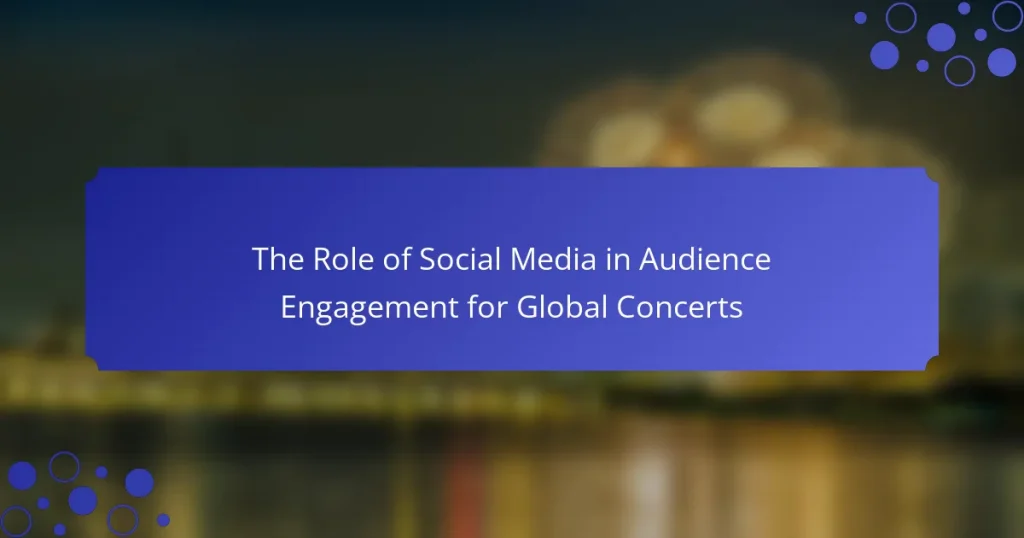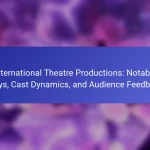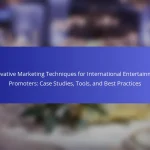The article examines the role of social media in enhancing audience engagement for global concerts. It highlights how platforms like Instagram, Twitter, and Facebook facilitate real-time interaction between artists and fans, fostering a sense of community and excitement through live updates and engaging content. The article also addresses the effectiveness of social media strategies in reaching specific demographics and increasing concertgoer participation. Additionally, it discusses challenges such as information overload, negative feedback, and privacy concerns that can impact audience engagement during live events. Overall, the content underscores the significance of social media in shaping memorable concert experiences and building artist-fan relationships.
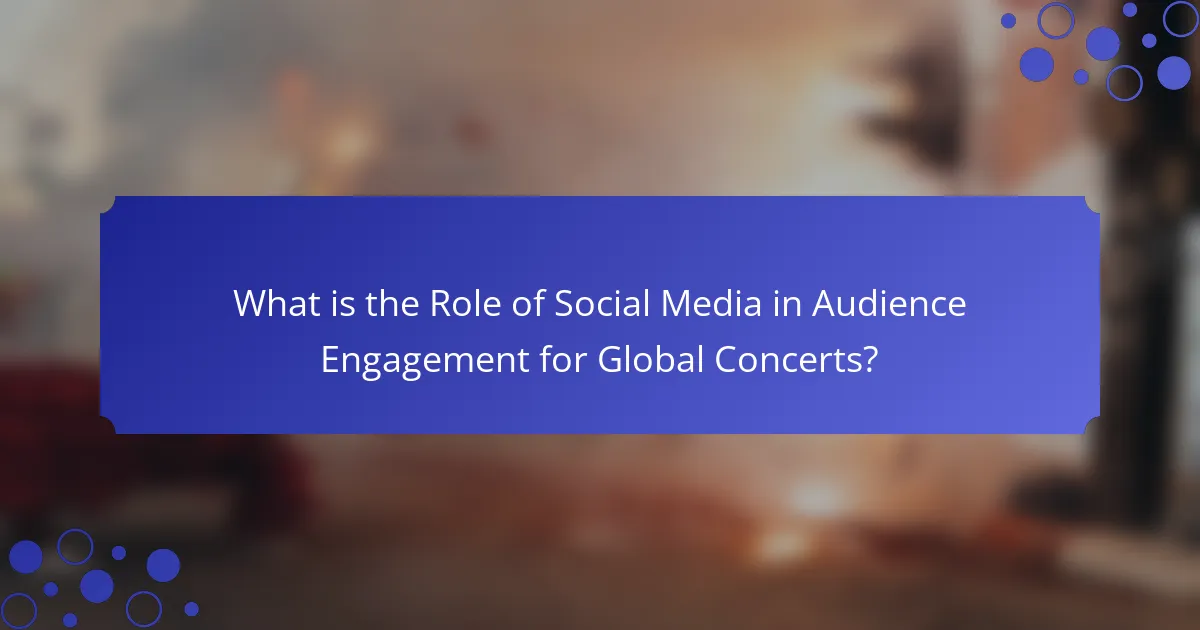
What is the Role of Social Media in Audience Engagement for Global Concerts?
Social media plays a crucial role in audience engagement for global concerts. It allows artists and organizers to connect with fans in real-time. Platforms like Instagram, Twitter, and Facebook facilitate live updates and announcements. Fans can share their experiences instantly, creating a sense of community. Engaging content, such as behind-the-scenes footage, increases excitement. Social media also enables targeted marketing strategies to reach specific demographics. According to a 2021 survey, 75% of concertgoers use social media to discover events. This highlights its effectiveness in audience outreach and engagement.
How does social media influence audience engagement in concert settings?
Social media significantly enhances audience engagement in concert settings. It provides a platform for real-time interaction between artists and fans. Concert-goers can share their experiences instantly through posts and live streams. This sharing creates a sense of community among attendees and those unable to attend. Additionally, social media allows for targeted promotions and personalized content, increasing anticipation and excitement. According to a study by the Pew Research Center, 69% of adults use social media, making it a vital tool for reaching large audiences. Engagement metrics such as likes, shares, and comments reflect the effectiveness of social media in fostering audience involvement.
What specific platforms are most effective for engaging concert audiences?
Social media platforms such as Instagram, Facebook, and Twitter are most effective for engaging concert audiences. Instagram allows for visual storytelling through photos and videos. Facebook facilitates event promotion and community building. Twitter enables real-time updates and audience interaction. According to a 2021 survey by Eventbrite, 93% of event organizers believe social media is vital for audience engagement. These platforms provide tools for direct communication and sharing experiences, enhancing audience connection and participation.
How do different demographics interact with social media during concerts?
Different demographics interact with social media during concerts in varied ways. Younger audiences, particularly millennials and Gen Z, frequently use platforms like Instagram and TikTok to share live experiences. They often post photos, videos, and updates in real-time, enhancing their connection with peers.
Older demographics, such as Gen X and baby boomers, tend to engage more passively. They may use Facebook to share memories after the event rather than during it. This age group often prefers to enjoy the concert without distractions.
Research indicates that 70% of concertgoers aged 18-24 share their experiences on social media, compared to only 30% of those aged 45 and above. This behavior reflects a generational difference in social media engagement.
Additionally, cultural factors influence how different demographics use social media at concerts. For example, fans from collectivist cultures may share more group experiences, while individualistic cultures focus on personal highlights.
Overall, social media interaction during concerts varies significantly by age and cultural background, shaping the audience’s engagement and experience.
Why is audience engagement important for global concerts?
Audience engagement is crucial for global concerts as it enhances the overall experience for attendees. Engaged audiences are more likely to participate actively during performances. This participation can lead to increased energy and excitement, benefiting both performers and spectators. Moreover, audience engagement fosters a sense of community among concert-goers. This community feeling can enhance brand loyalty towards the artists and organizers. Statistics show that concerts with high audience interaction see higher ticket sales and merchandise revenue. For instance, events that utilize social media to engage audiences can increase their reach and visibility. Engaging audiences also encourages word-of-mouth promotion, which is vital for future events.
What impact does audience engagement have on concert success?
Audience engagement significantly enhances concert success. Engaged audiences are more likely to attend, participate, and enjoy the event. This leads to higher ticket sales and increased revenue. Research shows that concerts with active audience interaction receive better reviews. Positive word-of-mouth from engaged fans boosts future attendance. Social media plays a crucial role in fostering this engagement. Platforms allow for real-time interaction, creating a sense of community. Engaged audiences often share their experiences online, amplifying the concert’s reach. Ultimately, strong audience engagement correlates with overall concert success.
How does audience engagement affect artist and brand reputation?
Audience engagement significantly impacts artist and brand reputation. High levels of engagement foster a positive perception among fans and consumers. Engaged audiences are more likely to share content and promote the artist or brand. This organic promotion can lead to increased visibility and credibility.
Research shows that brands with strong audience interaction see a 20% increase in customer loyalty. Artists who actively engage with their followers can enhance their public image. For example, artists like Taylor Swift maintain a strong reputation through direct interaction with fans on social media.
Conversely, low engagement can lead to negative perceptions. Brands that ignore their audience risk losing trust and relevance. Therefore, audience engagement is crucial for maintaining and enhancing reputation in the competitive landscape of music and branding.
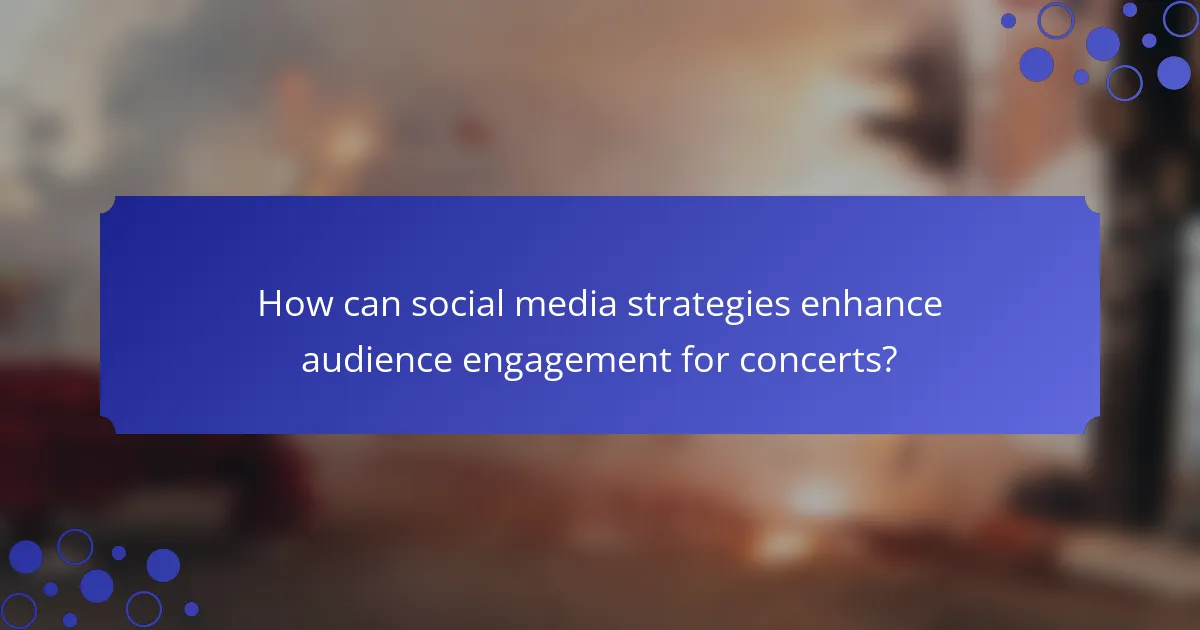
How can social media strategies enhance audience engagement for concerts?
Social media strategies enhance audience engagement for concerts by facilitating real-time interaction and building community. Platforms like Facebook, Instagram, and Twitter allow artists to share updates and behind-the-scenes content. This transparency fosters a connection between the artist and the audience. Additionally, live streaming performances can reach wider audiences who cannot attend in person. Engaging content, such as polls or Q&A sessions, encourages fan participation and feedback. According to a study by Eventbrite, 70% of concertgoers engage with artists on social media. This interaction increases anticipation and loyalty among fans. Overall, effective social media strategies create a dynamic environment that boosts engagement and creates memorable concert experiences.
What types of content are most engaging for concert audiences on social media?
Video clips of live performances are the most engaging content for concert audiences on social media. These clips capture the energy and excitement of the event. Behind-the-scenes footage also resonates well with fans. It provides an exclusive look at artists and the concert preparation process. Audience reactions, such as crowd shots and fan interactions, create a sense of community. Polls and interactive content encourage audience participation and feedback. High-quality images of artists and performances attract attention and shares. User-generated content, such as fan photos and videos, enhances engagement by fostering a sense of belonging. According to a study by Eventbrite, 79% of concertgoers share their experiences on social media, highlighting the importance of engaging content.
How can live streaming be utilized to boost audience participation?
Live streaming can significantly boost audience participation by providing real-time interaction opportunities. It allows viewers to engage through live chats, polls, and Q&A sessions. This interactivity creates a sense of community among participants. For instance, during global concerts, fans can comment and share reactions instantly. Studies show that 63% of viewers are more likely to engage with brands that use live video. Additionally, live streaming can include behind-the-scenes content, enhancing viewer connection to the event. This immersive experience encourages more active participation compared to pre-recorded content. Overall, live streaming transforms passive viewers into active participants.
What role do hashtags and challenges play in promoting concert engagement?
Hashtags and challenges significantly enhance concert engagement by creating a sense of community and participation. They encourage fans to share their experiences and connect with others. Hashtags allow users to easily find and follow concert-related content. This increases visibility and interaction on social media platforms. Challenges often invite fans to create content, such as dance videos or cover songs. This user-generated content fosters deeper connections with the artist and the event. According to a study by Eventbrite, 60% of concertgoers engage with event-related hashtags. This statistic highlights the effectiveness of hashtags in driving engagement. Overall, hashtags and challenges serve as powerful tools for amplifying audience interaction and excitement surrounding concerts.
How do social media campaigns contribute to concert promotion?
Social media campaigns significantly enhance concert promotion by increasing visibility and engagement. They enable artists and promoters to reach a broader audience quickly. Campaigns can generate buzz through targeted advertisements and organic posts. Platforms like Facebook, Instagram, and Twitter allow for real-time updates and interactions. Engagement metrics can be tracked to assess the effectiveness of promotional strategies. According to a 2021 study by Eventbrite, 93% of event creators use social media for promotion. This statistic highlights the reliance on social media in the concert industry. Additionally, user-generated content can amplify reach as fans share their experiences. Overall, social media campaigns are essential tools for modern concert promotion.
What are the best practices for creating effective social media campaigns for concerts?
Effective social media campaigns for concerts require strategic planning and execution. Start by identifying your target audience. Tailor content to their preferences and interests. Utilize visually appealing graphics and videos to capture attention. Share behind-the-scenes content to create excitement. Engage with followers through polls and Q&A sessions. Use event-specific hashtags to increase visibility. Collaborate with influencers to expand reach. Schedule posts for optimal times to maximize engagement. According to a study by Eventbrite, 83% of event organizers found social media to be effective for promotion.
How can user-generated content enhance concert visibility and engagement?
User-generated content enhances concert visibility and engagement by fostering authentic connections between artists and fans. This content includes photos, videos, and reviews shared by concert-goers. It creates a sense of community around the event. Social media platforms amplify this content, reaching wider audiences. For instance, posts with concert hashtags can trend, increasing visibility. According to a study by the Pew Research Center, 70% of social media users engage with live events online. This interaction boosts engagement and encourages more fans to attend future concerts. Additionally, user-generated content serves as social proof, influencing others to participate in similar events.
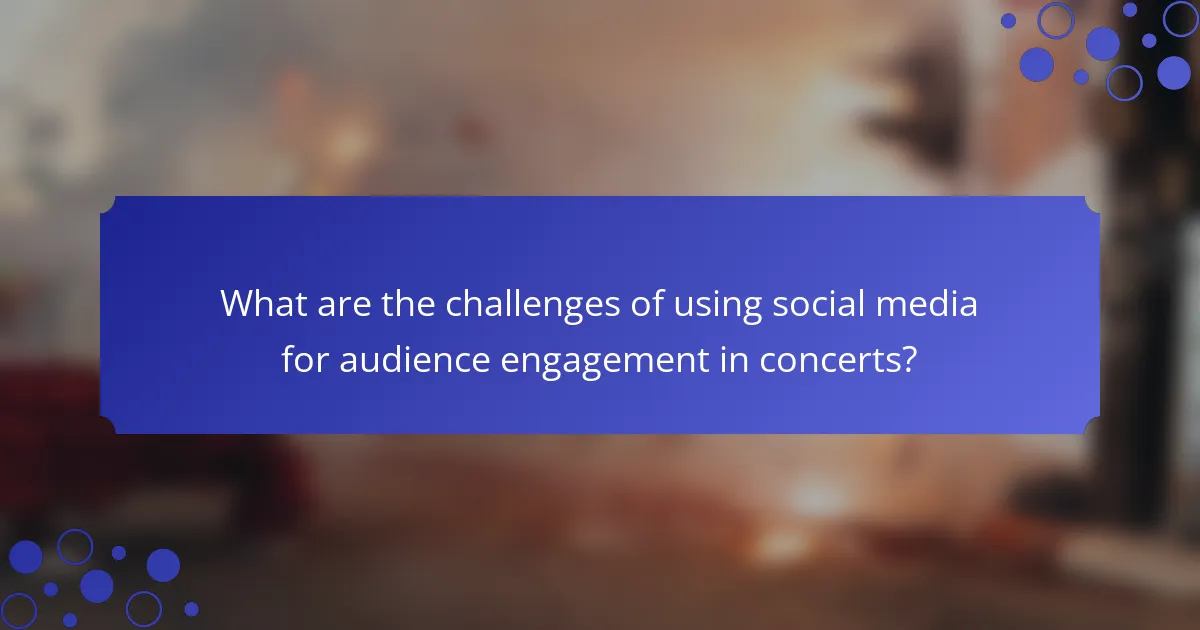
What are the challenges of using social media for audience engagement in concerts?
Social media can present several challenges for audience engagement during concerts. One major challenge is information overload. Concertgoers may be overwhelmed by excessive posts, making it difficult to focus on key updates. Another challenge is the potential for negative feedback. Public criticism can spread quickly on social platforms, impacting the concert’s reputation. Additionally, technical issues can arise. Poor internet connectivity can hinder live streaming or social media updates. Audience distraction is another concern. Attendees may prioritize social media interactions over the live experience. Privacy concerns can also affect engagement. Fans may hesitate to share personal moments publicly. Lastly, inconsistent messaging can confuse audiences. Misinformation can arise from unofficial sources, leading to misunderstandings about event details.
What potential pitfalls should organizers be aware of when using social media?
Organizers should be aware of several potential pitfalls when using social media. One major issue is misinformation. Incorrect information can spread quickly, leading to confusion among attendees. Privacy concerns also pose a risk. Sharing personal data without consent can violate privacy laws. Additionally, negative comments can harm an event’s reputation. Organizers must be prepared to manage public relations effectively. Furthermore, over-reliance on social media can alienate non-digital audiences. Some potential attendees may not engage with online platforms. Lastly, platform algorithms can limit visibility. This can hinder event promotion and audience reach.
How can negative feedback on social media impact concert engagement?
Negative feedback on social media can significantly reduce concert engagement. It affects public perception of the event and the artists involved. When negative comments proliferate, potential attendees may feel discouraged from participating. A study by Eventbrite found that 70% of concert-goers consult social media before attending. If they encounter negative sentiments, their likelihood of attending decreases. Furthermore, negative feedback can diminish ticket sales and overall enthusiasm. Artists may also experience a decline in fan interaction and loyalty. This creates a cycle where reduced engagement leads to less positive content being generated, further impacting future events.
What strategies can mitigate the risks associated with social media engagement?
Implementing clear social media policies can mitigate risks associated with social media engagement. These policies should outline acceptable behavior and content sharing guidelines. Regular training for staff on social media best practices is essential. This training can help employees understand the potential risks and how to avoid them. Monitoring social media activity allows for timely responses to negative comments or crises. Engaging with followers positively can also build a supportive community. Using privacy settings effectively protects sensitive information shared on social media platforms. Lastly, conducting regular audits of social media accounts can identify vulnerabilities and improve security measures.
What are the future trends in social media and audience engagement for concerts?
Future trends in social media and audience engagement for concerts include increased use of augmented reality (AR) and virtual reality (VR). These technologies provide immersive experiences that enhance viewer interaction. Social media platforms are likely to integrate more live streaming features, allowing real-time audience participation. User-generated content will continue to play a crucial role in promoting events and engaging fans. Data analytics will drive personalized marketing strategies, targeting specific audience segments effectively. Additionally, partnerships with influencers will become more common, leveraging their reach to engage wider audiences. A focus on sustainability and social responsibility will also shape concert promotions and audience engagement strategies.
How is technology shaping the future of audience interaction at concerts?
Technology is transforming audience interaction at concerts through enhanced engagement tools. Mobile apps allow fans to participate in real-time voting and song requests. Augmented reality (AR) experiences create immersive environments for attendees. Live streaming enables remote audiences to join the concert experience. Social media platforms facilitate instant sharing of moments and interactions. Data analytics provide insights into audience preferences and behaviors. This leads to personalized experiences tailored for fans. According to a 2021 report by Eventbrite, 70% of concertgoers are more likely to attend events with interactive technology.
What emerging platforms should concert organizers consider for engagement?
Concert organizers should consider platforms like TikTok, Discord, and Clubhouse for engagement. TikTok’s short-form video content attracts younger audiences and encourages viral trends. Discord offers community-building through dedicated channels and real-time interaction. Clubhouse facilitates live audio discussions, allowing artists to connect directly with fans. These platforms are increasingly popular and provide unique ways to engage audiences. For example, TikTok has over 1 billion monthly active users, indicating its vast reach. Discord has seen a surge in usage, especially among younger demographics, making it a valuable tool for fan engagement. Clubhouse’s unique audio format allows for intimate conversations that can deepen artist-fan relationships.
What practical tips can enhance social media engagement for concert organizers?
Engaging social media strategies for concert organizers include creating interactive content, utilizing live videos, and leveraging user-generated content. Interactive content such as polls and quizzes encourages audience participation. Live videos provide real-time engagement, allowing fans to connect with the event as it unfolds. User-generated content, like fan photos and videos, fosters community and authenticity. Regularly posting updates and behind-the-scenes content keeps the audience informed and excited. Collaborating with influencers can also expand reach and attract new followers. According to a study by Sprout Social, posts with images receive 650% more engagement than text-only posts.
How can concert organizers effectively measure social media engagement success?
Concert organizers can effectively measure social media engagement success by analyzing key performance indicators (KPIs). These KPIs include metrics such as likes, shares, comments, and follower growth. Engagement rates can be calculated by dividing the total interactions by the total followers. Tools like Google Analytics and social media insights provide detailed reports on audience behavior. For instance, tracking hashtag performance can reveal how many users engaged with the concert content. Additionally, monitoring post reach and impressions helps assess visibility. A study by Hootsuite found that brands with higher engagement rates see a 6.7 times higher conversion rate. This data supports the effectiveness of measuring social media engagement through these methods.
What tools are available to assist in managing social media for concerts?
Social media management tools for concerts include Hootsuite, Buffer, and Sprout Social. Hootsuite allows scheduling and monitoring across multiple platforms. Buffer offers analytics to optimize posting times and content. Sprout Social provides engagement tracking and reporting. These tools enhance audience interaction and streamline content management. They are widely used in the music industry to amplify concert promotion and audience engagement.
The main entity of the article is social media and its role in audience engagement for global concerts. The article examines how social media facilitates real-time interaction between artists and fans, enhances community building, and drives participation through targeted marketing strategies. It highlights the effectiveness of various platforms, such as Instagram, Twitter, and Facebook, in promoting concerts and engaging diverse demographics. Additionally, the article addresses the challenges and potential pitfalls of using social media for engagement, along with strategies and tools that can optimize audience interaction and measure success.
